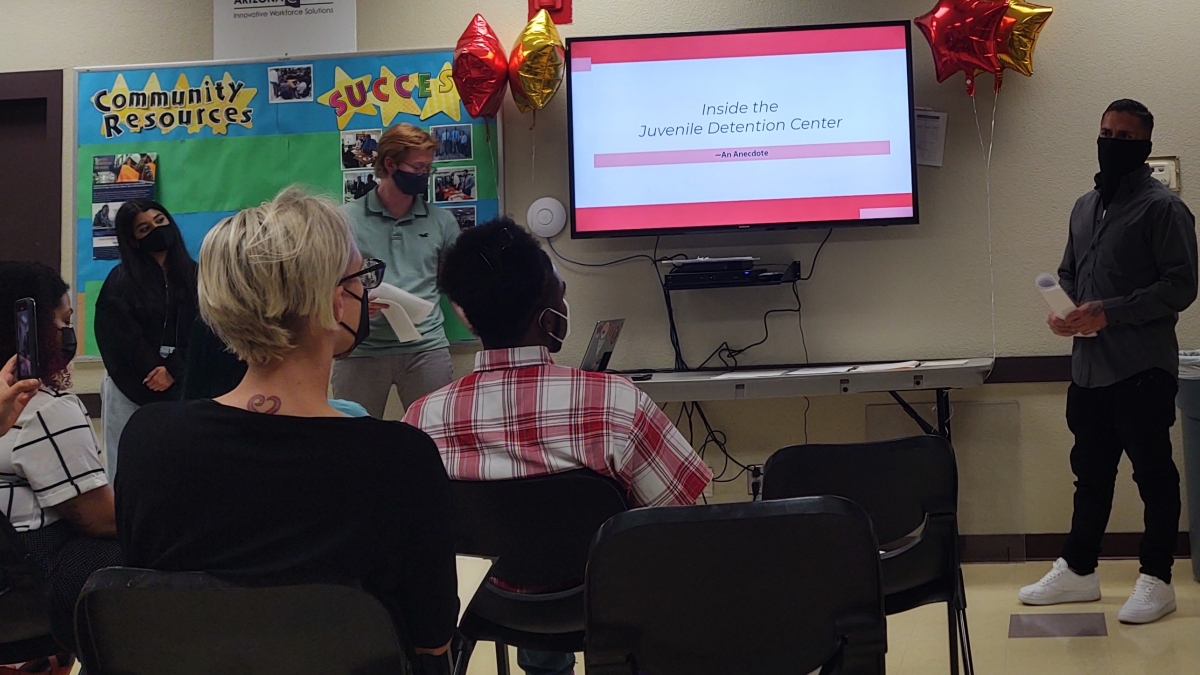Barrett Honors College Inside-Out Program fosters understanding, inspiration and transformation

Inside Out Program students present plans to take their project into the community. Photo by Nicole Greason/ASU
Open-mindedness, optimism, inspiration and transformation. These were the words used to express the sentiments of students at a recent ceremony to mark the end of the Inside-Out Prison Program Men and Feminism course that brought together students from Barrett, The Honors College, at Arizona State University and the Arizona Department of Corrections, Rehabilitation and Reentry.
The course used the Inside-Out Prison Exchange Program model. Inside-Out (IO) is an international educational program founded in 1997 by Lori Pompa at Temple University with the aim of bringing traditional college students and incarcerated people together in semester-long courses to explore and learn about crime and justice issues. The program gives students from inside and outside prison walls the opportunity to engage in conversations about crime, justice, freedom, inequality and other social concerns, address these issues and foster positive change.
Inside-Out students respect each other’s privacy, use first names only and agree to keep conversations within the course confidential.
Barrett Honors Faculty Fellow Rachel Fedock brought the program to the honors college in 2019, with support from the college’s leadership and a grant from the Sol and Esther Drescher Endowed Development Fund at Barrett. The Drescher-Mulzet travel fund currently supports the program. This marks the third semester Fedock has led the IO program and the Men and Feminism course.
The Men and Feminism course explores the relationships between masculinity and patriarchy, violence and its cultures, and gender and how feminism can cure the social issues that arise from these interconnections. Students look at the roles media and other forms of cultural socialization play in the enforcement of patriarchy by means of documentaries and academic texts, taking an interdisciplinary approach, including women's studies, gender studies, sociology, psychology and philosophy.
The Reentry Center, in north Phoenix, is an alternative to prison for those who violated their parole. Anyone who is eligible for parole, no matter the crime — except for sex offenders — can receive services at the center.
Reentry Center students, as well as those from Barrett, had to go through an application and interview process in order to participate in the class.
Javon, an inside student, said his class time was marked by “open-mindedness and optimism.”
“I feel we’ve all grown as individuals. For me, the class created optimism in my life. We must adopt a feminist message of love and equality to make the world a better place for future generations,” he said.
“Transformational and educational are two words I would use to refer to this course. We are surpassing boundaries to create change. I never understood what it was to create something truly transformative until this course. I will use what I’ve learned here throughout my life,” said Celesté, a Barrett student.

Students discuss ideas for a project in the Inside-Out program. Photo by Nicole Greason
Course participants designed projects focused on taking the concepts they learned into the community — including partnerships with school districts to host classes for young students that explore issues of consent, feminism, toxic masculinity and rape culture with the goal of helping students avoid oppressive behavior and practice compassion — and creating a feminism-centered class for boys in juvenile detention centers.
“I was curious. I had never heard the words feminism, patriarchy and toxic masculinity. It (the Men and Feminism course) opened my mind to the underlying cause of my addictions. Extending this class to other people will give them hope, like I found,” said Rusty, an inside student.
While Barrett students receive honors credit, all students who complete the Barrett IO Men and Feminism course are invited to join the Barrett Think Tank, which was established in 2019 in an effort to bring projects started in the course to fruition.
“This class provides the opportunity to begin tearing down walls between us. We are often encouraged to look at people on the other side of walls, whether physical or metaphorical, as outsiders, seeing them as different from us, and at worst, we dehumanize them,” Fedock said.
“Inside-Out creates an environment where all students can appreciate each other’s humanity and struggles while cultivating new perspectives on complex social issues. Students come out of the course with a refined set of communications skills and deepened capacity for compassion, where they learned to navigate challenging conversations with people from dramatically different backgrounds, a skill set particularly valuable during these times.”

